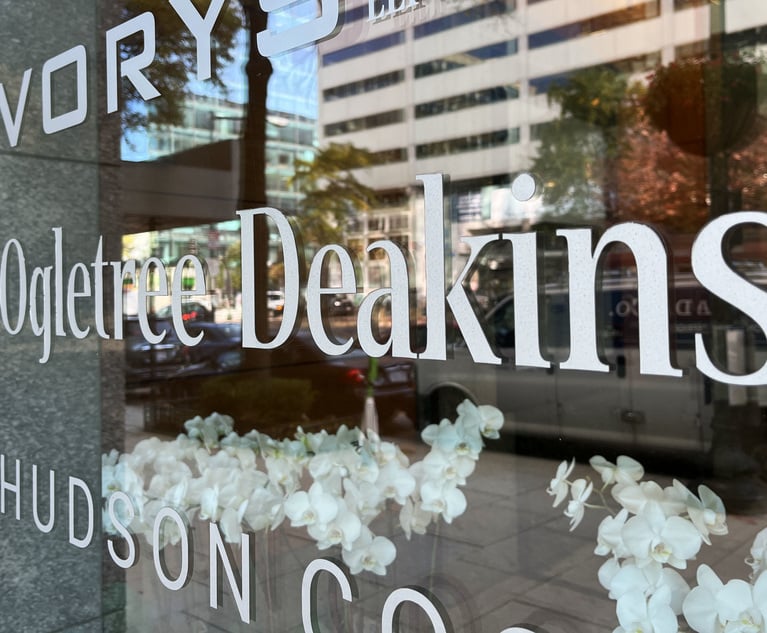 Justice Samuel Alito Jr. Credit: Diego M. Radzinschi / ALM
Justice Samuel Alito Jr. Credit: Diego M. Radzinschi / ALMUS Justice Department Takes Alito's Side in New Stance Against Union Fees
By reversing the federal government's long-held position that "fair share" fees paid to public employee unions by nonmembers are lawful, the U.S. Justice Department sent an early holiday present to Justice Samuel Alito Jr., who has led recent attacks on the constitutionality of the fees. But maybe, in a long shot for unions, the late Justice Antonin Scalia will have the final word.
December 07, 2017 at 03:29 PM
7 minute read
By reversing the federal government's long-held position that “fair share” fees paid to public employee unions by nonmembers are lawful, the U.S. Justice Department sent an early holiday present to Justice Samuel Alito Jr., who has led recent attacks on the constitutionality of the fees. But maybe, in a long shot for unions, the late Justice Antonin Scalia will have the final word.
Noel Francisco, the U.S. solicitor general, on Wednesday filed a friend-of-the-court brief that urged the justices to overrule a 40-year-old decision, Abood v. Detroit Board of Education. That decision rejected claims that the fees, paid to cover nonunion members' share of the costs of collective bargaining, violated the First Amendment.
 Solicitor General Noel Francisco. Credit: Diego M. Radzinschi/ The National Law Journal
Solicitor General Noel Francisco. Credit: Diego M. Radzinschi/ The National Law Journal Less than two years ago, the Justice Department, under the Obama administration, had defended the constitutionality of fair share fees in the high court in Friedrichs v. California Teachers Association. In March 2016, the court deadlocked in the case after the death of Scalia. Rebecca Friedrichs was represented by Francisco's former Jones Day partner, Michael Carvin.
The Justice Department's flipped position on the union fees question is the third time this term that Main Justice, led by U.S. Attorney General Jeff Sessions, has changed the government's course in a major case. The department now supports a class action ban in workplace arbitration agreements and Ohio's system for purging from its registration rolls inactive voters.
In his Janus brief on the government's new position, Francisco wrote:
Following the grant of certiorari in this case, the government reconsidered the question and reached the opposite conclusion. Largely for the reasons articulated by this court in Harris and during the argument in Friedrichs, the government's previous briefs gave insufficient weight to the First Amendment interest of public employees in declining to fund speech on contested matters of public policy. Abood's result is inconsistent with prevailing First Amendment precedent and should be overruled.
Some court observers noted Francisco's brief did not present any detailed justification to the court for such a major change coming so soon after the same office had defended Abood and for breaking with the position held by Republican and Democratic solicitors general over the last 40 years. One high-court veteran, speaking anonymously to protect relationships at Main Justice, called the Justice Department's maneuvering “one of the most audacious things I've ever seen a solicitor general do.”
Francisco's reference in his brief to “Harris” was to the high court's 2014 decision in Harris v. Quinn. In that case, Alito, leading a 5-4 majority, outlined his problems with Abood. Two years before that decision, Alito in Knox v. Service Employees International Union also signaled his belief that Abood was wrongly decided.
Taken together, the decisions ignited an effort by organizations such as the National Right to Work Legal Defense Foundation, which is counsel at the Supreme Court to Mark Janus, and the Competitive Enterprise Institute to get cases challenging Abood to the high court as quickly as possible.
In her dissenting opinion in Harris, Justice Elena Kagan wrote: “Not until two years ago, in Knox v. Service Employees, did the court so much as whisper (there without the benefit of briefing or argument) that it had any misgivings about Abood.”
During last term's arguments in Friedrichs, which took place a month before Scalia's death, the unions appeared destined to lose at the hands of a conservative 5-4 majority. But some observers and scholars questioned whether Scalia would rule with his fellow conservatives because of a 1991 opinion involving Abood—Lehnert v. Ferris Faculty Association.
That opinion now is at the center of an amicus brief in the Janus case. The amicus parties, Reagan administration Solicitor General Charles Fried of Harvard Law School and Yale Law's Robert Post, submitted their brief in support of neither side.
In Lehnert, the justices struggled with the types of expenses for which a union could constitutionally require contributions from non-union members.
Scalia, concurring and dissenting in part, wrote: “What is distinctive, however, about the 'free riders' who are nonunion members of the union's own bargaining unit is that in some respects they are free riders whom the law requires the union to carry—indeed, requires the union to go out of its way to benefit, even at the expense of its other interests.”
 Antonin Scalia, 2013. Credit: Diego M. Radzinschi / NLJ
Antonin Scalia, 2013. Credit: Diego M. Radzinschi / NLJ Scalia's solution? “I would hold that contributions can be compelled only for the costs of performing the union's statutory duties as exclusive bargaining agent.”
Scalia said that it is the state that is imposing costs on the union and it is the state's power to compel non-members to support the union financially in order to eliminate the inequity that would otherwise arise from mandated free-ridership. That power, he added, “does not go beyond the expenses incurred in discharge of the union's 'great responsibilities' in 'negotiating and administering a collective bargaining agreement and representing the interests of employees in settling disputes and processing grievances.'”
Scalia's opinion was joined by Justices Anthony Kennedy, Sandra Day O'Connor and David Souter.
Fried and Post, represented by former Solicitor General Seth Waxman of Wilmer Cutler Pickering Hale and Dorr, argued that Scalia's “statutory-duties” test answers the problems the high court faced in Harris and in Abood.
Waxman said that “the test protects against the compelled support of lobbying, advertising, and other speech outside of a state's system for managing its workforce. The test also preserves the principles that inform the broad range of the court's compulsory-fee cases, which recognize that the government's interests in funding comprehensive regulatory regimes through mandatory fees are entirely compatible with the First Amendment interests of dissident fee payers.”
The high court has not scheduled an argument date yet for the Janus case but it is expected to be heard sometime in February.
The Justice Department's brief in Janus v. American Federation of State, County and Municipal Employees is posted below.
This content has been archived. It is available through our partners, LexisNexis® and Bloomberg Law.
To view this content, please continue to their sites.
Not a Lexis Subscriber?
Subscribe Now
Not a Bloomberg Law Subscriber?
Subscribe Now
NOT FOR REPRINT
© 2025 ALM Global, LLC, All Rights Reserved. Request academic re-use from www.copyright.com. All other uses, submit a request to [email protected]. For more information visit Asset & Logo Licensing.
You Might Like
View All
3rd Circuit Strikes Down NLRB’s Monetary Remedies for Fired Starbucks Workers

‘A Force of Nature’: Littler Mendelson Shareholder Michael Lotito Dies At 76
3 minute read
Employers Scramble to Get Immigration Records in Order Ahead of Trump Crackdown
6 minute read
Trending Stories
- 1Data Breach Lawsuit Against Byte Federal Among 1,500 Targeting Companies in 2024
- 2Counterfeiters Ride Surge in Tabletop Games’ Popularity, Challenging IP Owners to Keep Up
- 3Health Care Data Breach Class Actions Saw December Surge in NY Courts
- 4Florida Supreme Court Disbars 3, Suspends 11, Reprimands 1 in Final Disciplinary Order of 2024
- 5Chief Justice Roberts Ends Year With Defense Against 'Illegitimate' Attacks on Judiciary
Featured Firms
Law Offices of Gary Martin Hays & Associates, P.C.
(470) 294-1674
Law Offices of Mark E. Salomone
(857) 444-6468
Smith & Hassler
(713) 739-1250










